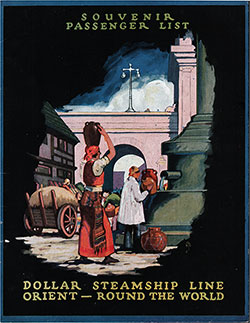Shanghai, China Passenger Lists 1926-1932
Passenger Lists available from the GG Archives from the Port of Shanghai, China. Organized by Date of Departure, Steamship Line, Steamship or Ocean Liner, Class of Passengers, Route, and the Ship's Captain.
Shanghai 31.14 N., 121.29 E.—Is situated twelve miles above the junction of the Huangpu with the Yaugtze Kiang. Three distinct sections comprise the port of Shanghai, each having its own municipal management—the Chinese Shanghai, the French Concession and the International Settlement.

1926-09-30 SS President Van Buren Passenger List
Steamship Line: Dollar Steamship Line
Class of Passengers: Cabin Class
Date of Departure: 30 September 1926
Route: New York to Marseilles via Havana, Cristobal, Balbao, Los Angeles, San Francisco, Honolulu, Kobe, Shanghai, Hong Kong, Manilla, Singapore, Penang, Colombo, Port Said and Alexandria
Commander: Captain M. Ridley

1929-04-20 Empress of Asia Passenger List
Steamship Line: Canadian Pacific Line
Class of Passengers: First and Second Class
Date of Departure: 20 April 1929
Route: Vancouver and Victoria to Manila via Yokohama, Kobe, Nagasaki, Shanghai, and Hong Kong
Commander: Captain A. J. Hailey, R.N.R.

1930-06-12 SS Empress of Canada Passenger List
Steamship Line: Canadian Pacific Line
Class of Passengers: First and Second Class
Date of Departure: 12 June 1930
Route: Vancouver and Victoria to Manila via Honolulu, Yokohama, Kobe, Shanghai, and Hong Kong
Commander: Captain A. J. Hailey, R.N.R.

1932-08-05 SS Empress of Canada Passenger List
Steamship Line: Canadian Pacific Line
Class of Passengers: First Class and Tourist Third Cabin
Date of Departure: 5 August 1932
Route: Manila to Victoria and Vancouver via Hong Kong, Shanghai, Kobe, Yokohama, and Honolulu
Commander: Captain A. J. Hailey, R. N. R.

1932-10-22 SS Empress of Canada
Steamship Line: Canadian Pacific Line
Class of Passengers: First and Tourist Class
Date of Departure: 22 October 1932
Route: Vancouver and Victoria to Manila via Honolulu, Yokohama, Kobe, Shanghai, and Hong Kong
Commander: Captain A. J. Hailey, R.N.R.
By the Sbunghai-Nanking Railway, an overland route ria Tientsin is open, while southwards, the Slinnghai-HangchowOüngpo Railway links up northern Chekiang. Shanghai is the great emporium of China, and as an exchange mart for commodities of all sorts, its position at the entrance of the Yangtze Valley gives to this port pre-eminence over all competitors.
The chief industrial concerns of Shanghai are cotton (pinning and weaving mills, silk lilatures, soap works, chemical works, extensive dock, engineering and ship-building works, paper and flour mills, tanneries, oil mills, match factories, tobacco factories, printing and lithographic works, and a Government arsenal. The Chinese population is probably over 1,000,000. (Finance and Commerce Year Book, 1922)
⚠️ About Accuracy in Historical Records Research Tip
Context. The GG Archives presents passenger lists as faithfully as possible to the original documents. While OCR is generally accurate, portions of these collections—especially image captions and some transcriptions—are typed by hand and may include typographical or spelling variations. The original manifests themselves also contained clerical inconsistencies (names recorded phonetically, mid-voyage corrections, etc.).
What this means for your research:
- Search variant spellings of names (e.g., “Schmidt/Schmitt/Smith,” “Giuseppe/Joseph”).
- Cross-reference with immigration cards, passport applications, naturalization files, city directories, and newspapers.
- Treat manifests as primary sources with historical quirks—use them alongside corroborating records.
- For place names, consider historical borders and language variants (e.g., Danzig/Gdańsk, Trieste/Trst).
How to cite. When quoting a name from a manifest, consider adding [sic] for obvious misspellings and include a note such as “spelling as printed in original passenger list.”
Need help? If you spot a likely transcription error in captions, feel free to contact us with the page URL and a brief note—we love community input. 🙏
Curator’s Note
For over 25 years, I've been dedicated to a unique mission: tracking down, curating, preserving, scanning, and transcribing historical materials. These materials, carefully researched, organized, and enriched with context, live on here at the GG Archives. Each passenger list isn't just posted — it's a testament to our commitment to helping you see the people and stories behind the names.
It hasn't always been easy. In the early years, I wasn't sure the site would survive, and I often paid the hosting bills out of my own pocket. But I never built this site for the money — I built it because I love history and believe it's worth preserving. It's a labor of love that I've dedicated myself to, and I'm committed to keeping it going.
If you've found something here that helped your research, sparked a family story, or just made you smile, I'd love to hear about it. Your experiences and stories are the real reward for me. And if you'd like to help keep this labor of love going, there's a "Contribute to the Website" link tucked away on our About page.
📜 History is worth keeping. Thanks for visiting and keeping it alive with me.
